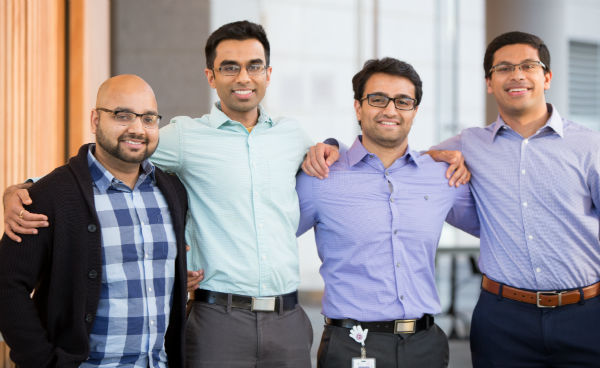
Academius founders: (right to left) the author, Kevin Fernandes, Dinesh Rai and Mohammod Arafat
Few ventures in life result in simultaneous, definitive outcomes; medical school is one of them.
On Match Day, virtually every fourth-year medical student in the United States—myself included—will discover where we will embark on the most rigorous portion of our medical training.
This important day fuels countless hours of anxious information-gathering from online forums, desperation-driven meetings with deans and advisors and mini panic attacks that persist even after we’ve submitted our top choices via a “rank list.” All of this will culminate in a momentous reveal on Friday, when the all-important outcomes finally become reality.
As Match Day edges closer, I feel the same excitement and nervous energy as my colleagues do, but I’ve also given considerable thought to the day’s outcomes from the perspective of a data analyst.
The Match and Machines
A large portion of my time in medical school was spent co-founding Academius—a medical-education startup that helps students prepare for residency interviews, track their interview experiences and simulate their rank lists while also enabling school administrators to provide more evidence-based advising. Through my work on this project, I’ve begun to see how Match Day outcomes and human wishes present a unique challenge in analysis.
One might assume that favorable outcomes are those that match students to the top-ranked programs around the country. However, each student has unique preferences when considering residency programs: location, reputation, family obligations, significant others, call schedules, gut feelings, personalities of residents, mentor availability—the list is nearly endless.
These human factors, along with the students’ performance during interviews, are so personal that no amount of technological sophistication can account for what influences match outcomes the most: human desires and needs.
I wanted to be near my family and friends in the Midwest but felt the professional pull of programs with more tech-related opportunities on both coasts. For me, the Match will decide not only where I move, but also where my parents and extended family might relocate in the future.
In a situation so confounded by external factors, personal circumstances and emotions, how do we interpret the results using a data-analysis product?
Technology, Meet Humanism
To address this issue, we added a simulator to Academius that allows students to input their preferences, permitting students to account for at least some of the human factors that go into creating a rank list. Extrapolating from these simulations, we gain insight into why a given student might choose a specific residency program as his or her top choice.
In other words, we do the best we can to interpret the data—recognizing that technology is meant to augment our understanding of human nature rather than supplant it. As a member of the Gold Humanism Honor Society, I know that paying homage to humanism and recognizing its value are woven into my professional identity, both as a future physician and as a tech entrepreneur.
My clinical experiences have also illuminated how humanism picks up where technology leaves off. There is virtually no perfect physical-exam maneuver, lab test, or diagnostic-imaging procedure; each has its limits, biases, and confounding factors. Helping patients navigate ambiguous results, while respecting the emotions evoked in difficult circumstances and allowing for varying levels of education, is the role of the physician—the humanistic bridge between technology and patients.
Every day, physicians take impersonal lab results and grant them unique and specific meaning in individuals’ lives. Similarly, on Match Day we take our matter-of-fact results and begin to craft our own narratives, endowing our results with poignancy and meaning. In both instances, the goal is the same: apply humanistic values to interpret data and improve human lives.
Looking Ahead
In a world with machine-learning algorithms and artificial intelligence, I predict that effectively utilizing technology to understand our human experiences and integrating humanistic values into our technologies will be crucial in the next era of healthcare and technology.
As we don our fresh white coats in an increasingly technology-centered world, I believe it’s our obligation as young physicians to celebrate and nurture the nexus of humanism and technology. Equipping ourselves with world-changing technology while respecting the humanity that grants our lives meaning, we stand poised to serve well our patients, communities, and world.

